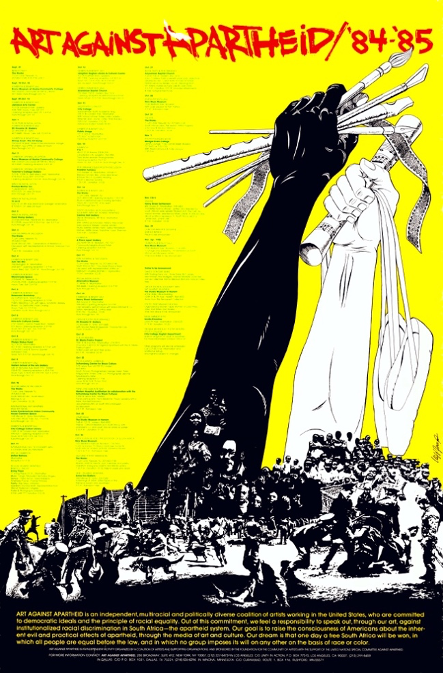Upcoming Exhibition: “Get Up! Stand Up!” Chicago Arts Against Apartheid
Interview with the Gallery Management Practicum Students
Can you describe your role in developing the “Get Up, Stand Up” exhibition? What are some of the daily tasks you are entrusted with?
Nabeeha Kazi:
The exhibition, Get Up, Stand Up: Chicago Acts Against Apartheid, commemorates Nelson Mandela’s 30th presidential election anniversary and honors Chicago’s involvement in supporting the Anti-Apartheid movement in South Africa and neighboring countries.
All of us in the group have a shared role in figuring out the different aspects of the exhibition. From looking into Columbia’s Chicago Anti-Apartheid Movement Collection for more information pertaining to the Anti-Apartheid movement to the setting up and arrangement of the exhibition, everyone has had equal dedication and part in the planning process of it all. A lot of research takes place during the first couple of weeks of planning. So, we’ve divided that workload amongst each other to quicken up the process and gather as much information as we can.
Keldyn Miller: So far, my team and I do not have set roles within the group but as we get closer to installation, we will be narrowing down our specific responsibilities including curatorial, collections management, design, marketing, and programming. As of now, each group member has been entrusted with keeping up with research and gathering materials that coincide with the goals of the exhibition itself, which aims to emphasize how Columbia, like Chicago, is a place of dialogue and action.
In your opinion, what are some of the highlights of the exhibition you can share?
Nabeeha Kazi: One of the highlights of the exhibition is the location! It’s going to be located on the ground floor of the Student Center near the Tech Bar, right when you enter the building. Our vision is to have pictures from the protest on the glass windows so that viewers who pass by the building are intrigued. A lot of the material from the Archives are protest posters, booklets that had information and updates about the Anti-Apartheid movement in the 1980s, t-shirts that were worn during protest so it’s a very compelling collection that allows for conversations around freedom of speech and the rights and wrongs of humanity.
Keldyn Miller: The biggest highlights of the exhibition are the many different kinds of art that were used to support the Anti-Apartheid Movement. We will be featuring all kinds of vibrant and dynamic posters that were made by people in South Africa and surrounding countries. Also, new video interviews of three veteran Chicago-based activists, Dr. Lisa Brock, Otis Cunningham, and Dr. Cheryl Johnson-Odim, record the testimony of their fight against apartheid in South Africa and inspire us to fight for social justice.
Columbia archives team has been an incredible resource for us to learn more about Chicago’s involvement in this movement, and we are excited to continue collaborating with them to include physical ephemera brought to the school from participating activists. Among these artifacts are songbooks, photos, pamphlets, and brochures (but we are still nailing down the specifics!).
Have you discovered any surprising connections or themes emerging as you’ve been researching and developing the exhibition?
Nabeeha Kazi: I think especially in today’s times, it’s very important as people of a generation who are highly aware of the matters of the world to help others amplify their voices because of the injustices they face. One thing that we reflect upon as a group is communication and how there was difficulty at that time to communicate about gatherings and protesting and educating people in spite of the fear of being caught. Keeping that in mind, we want to showcase, that despite that difficulty and fear, communities still came together to call out regimes that exploited people even if it was just 10-12 people; voices were still heard, and people started to listen and communicate.
Keldyn Miller: Learning about the impact that Chicago activists had on the movement has been really special and it puts into perspective how much power we have when we come together as a collective. It is insanely impressive how much Chicagoans were able to help end apartheid in South Africa, and I feel honored to be able to help share some of their stories alongside my team!
GET UP! STAND UP!
Chicago Acts Against Apartheid
The Center Galleries
Columbia College Chicago
754 S. Wabash Ave.
April 25 – September 30, 2024
Free and open to the public
Opening Reception
Thursday, April 25, 2024
5:00 – 8:00 pm
GET UP! STAND UP! recognizes how Chicago-based activism supported the anti-apartheid cause in South Africa and neighboring countries. As we continue the fight against apartheid and oppression today, join us in commemorating the 30th anniversary of Nelson Mandela’s presidential election in South Africa.
Drawing on the college’s Chicago Anti-Apartheid Movement Collection, the installation features protest posters, historic artifacts and ephemera. New video interviews of three veteran Chicago-based activists, Dr. Lisa Brock, Otis Cunningham, and Dr. Cheryl Johnson-Odim, record the testimony of their fight against apartheid in South Africa. Inspired by the activism of this community coalition, GET UP! STAND UP! is a call to action for us to continue the fight for social justice.
GET UP! STAND UP! is presented in collaboration with the Columbia College Chicago Archives and Special Collections and is produced by students in the Gallery Management Practicum course, a student-run collaboration between the Business and Entrepreneurship Department and the Student Center.
GET UP! STAND UP! is supported through The Council of Independent Colleges – Humanities Research for the Public Good grant.
